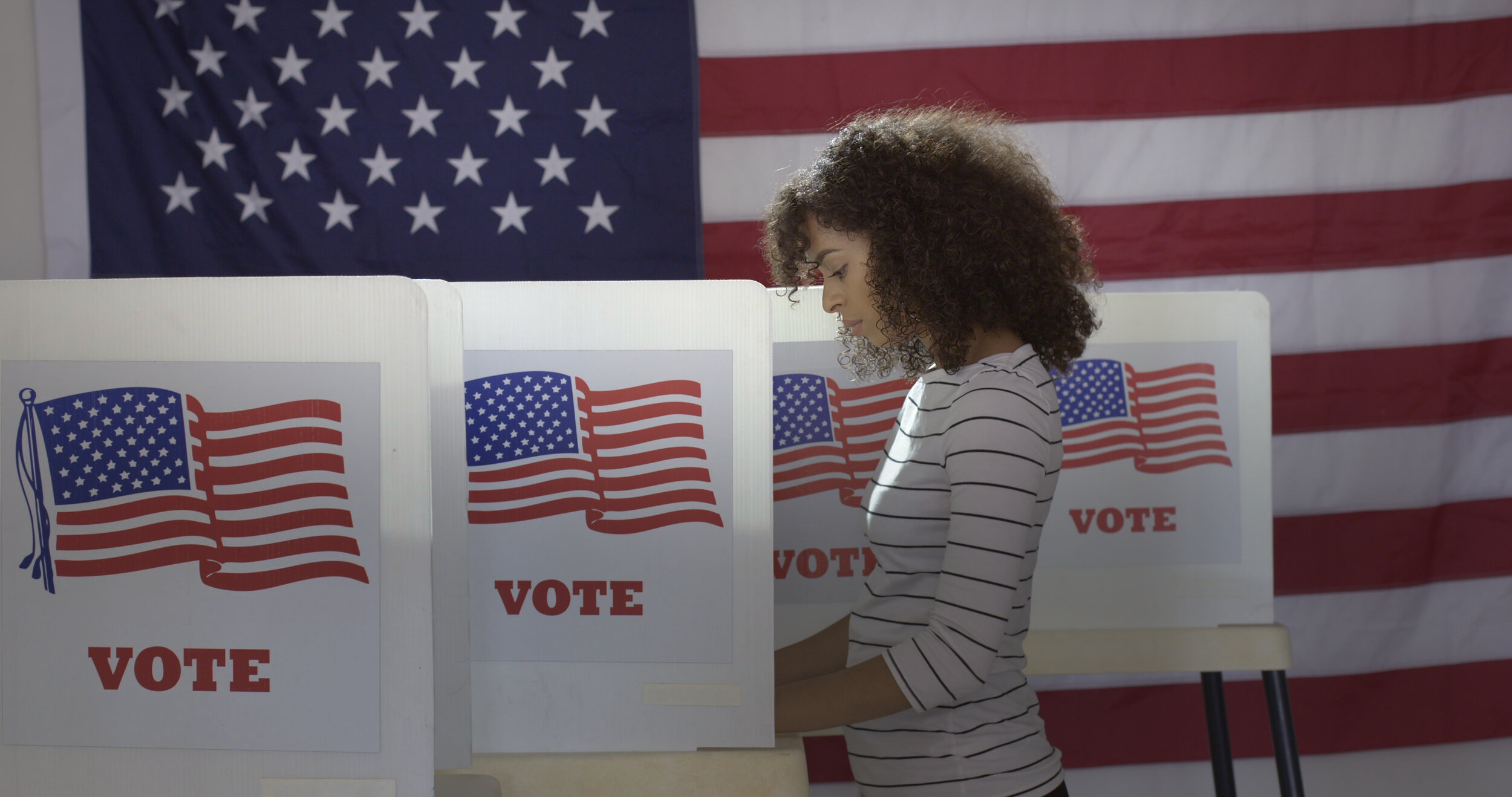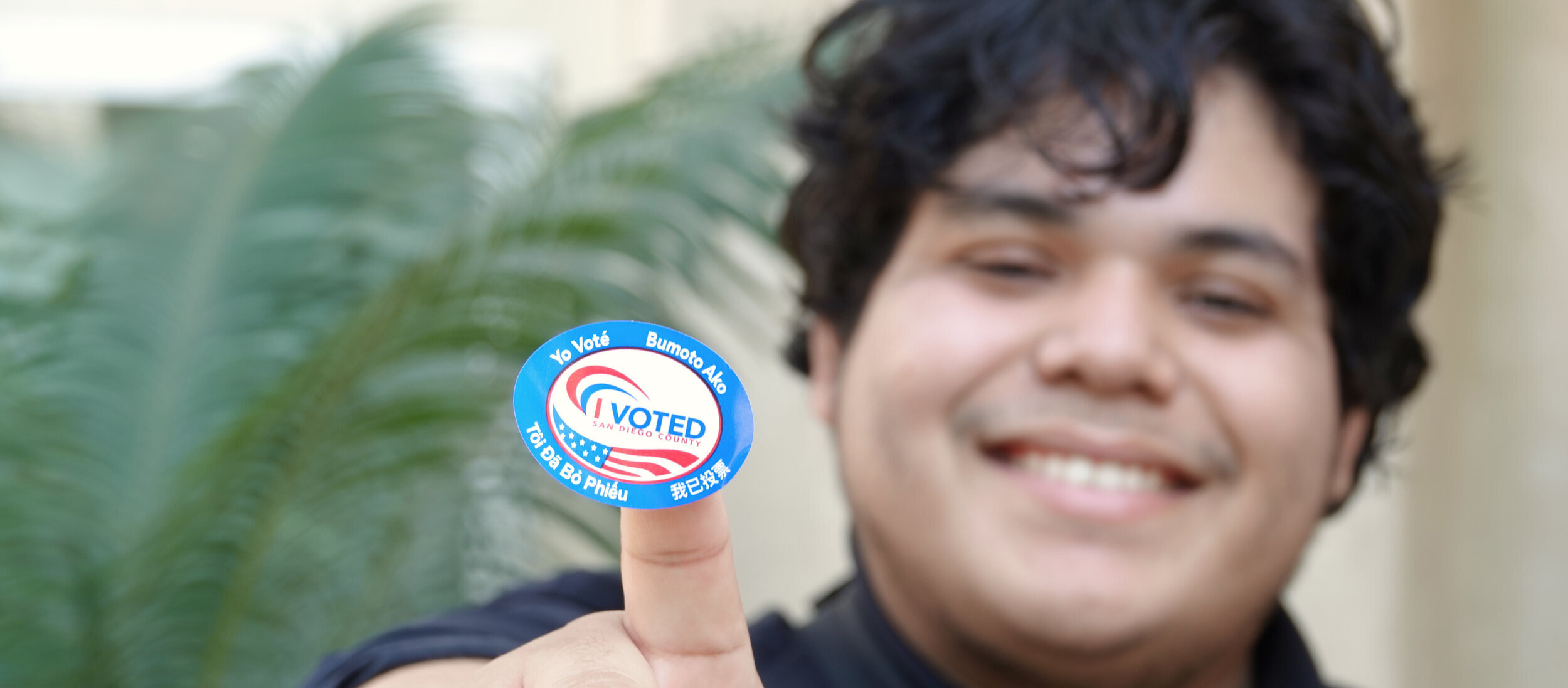Will We Vote?
Latinos may play a pivotal role in the Nov. 3 national election. Photo by Vesperstock/Shutterstock
Is a long-predicted Latino wave finally poised to decide who becomes president? The potential is there, but a close examination of Texas Latinos reveals mistrust of government can undermine political enthusiasm
Read here about the decades of struggle to win the right to vote for Latinos in the United States.
Read here about how Latinos are reshaping the political landscape in Trump Country outside of Philadelphia.
Across the United States, tens of millions of Americans have cast a record number of early votes in an election many are calling the most important of their lifetimes—and one in which Latinos may play a historically influential role.
Having outnumbered Blacks for the first time, U.S. Latinos this year compose the largest nonwhite block of eligible voters. Not only does it potentially amplify their voice in the presidential choice, but it could also provide them with a powerful tool to impact policy issues important to them.
But they get that only if they turn out and vote according to their numbers.
Will they?
That question hangs over the Latino electorate nationwide. Yet one of the states where it’s most critical is Texas, which polls suggest has become a possible swing state in determining whether Donald Trump continues to occupy the White House.
A recent poll by the University of Houston and Univision found that enthusiasm for the election among Latinos is running high—some 90 percent in Texas and nationally said they definitely or will likely cast a ballot.
But there’s a gap between what people say they’re going to do and what they actually do.
According to 2016 presidential election voter files analyzed by the Texas Organizing Project, a nonprofit that mobilizes Black and Latino voters, about half of eligible Latinos actually voted. That was below the 67.1 percent of whites and 54.3 percent of Blacks who cast ballots.
So how do we explain that gap between intention and action? What keeps many Latinos from getting to the polls?
In the past year, I traveled throughout Texas with two researchers, anthropologist Michael Powell and sociologist Betsabeth Monica Lugo, trying to better understand why Latinos vote or don’t vote.
Commissioned and funded by the Texas Organizing Project Education Fund, we interviewed 104 eligible voters in the Lower Rio Grande Valley and in the metro regions of Dallas, San Antonio, Houston and El Paso.
Rather than trying to understand the practice of voting through the usual lens of political science, we used our training as social scientists to understand it as social behavior.
We wanted to learn more about how Latinos perceive government, how they relate to political candidates and politicians, and how their life experiences shape whether they vote.
We felt this approach might give us better clues. And indeed, our findings contradicted many popular myths and misconceptions about Latino voters.
We didn’t find that they were apathetic about politics or government. The vast majority of people we interviewed were following political news and had strong opinions about elected officials and government.
Rather, our study showed that Latinos continually feel ignored by the political system and believe that elected leaders don’t understand their realities. The majority of them had never met a political candidate or been contacted by a campaign.
Among voters, we found a low degree of partisanship even among those who consistently vote Democrat or Republican. This is partly due to the fact that neither party has historically engaged Latinos, and that Latinos do not come from families that have been voting a long time, passing on party loyalty between generations. Instead, we found Latinos to be highly independent thinkers, often with mixed views on issues that range across the ideological spectrum.
But perhaps the most interesting finding had to do with what differentiates voters from nonvoters—who almost seem to live and move in different worlds.
In general, we found evidence that Latinos who vote often speak and act in more empowered ways. They express a stronger sense of belonging. They feel they have a right to be heard. And, they believe they can influence political outcomes. They have a clearer idea of how government policies affect their lives, and usually have a circle of friends and family to talk to about politics.
On the other hand, nonvoters are often disempowered politically and in other areas of their life. They don’t believe their votes matter and are not sure if government can make their lives better. And the biggest difference is that they don’t live and move among other voters. For example, none of the nonvoters we interviewed had grown up with parents who voted.
Signs line the driveway of an early voting center in McKinney, Texas. Photo by Sara Carpenter/Shutterstock
Does one vote really matter?
Voting, we realized, is more of a social habit than a rational choice. It’s a practice that people develop over time, through the example of others. Juan Carlos Flores, a 28-year-old father of two young daughters in Brownsville, is an example of someone who did not grow up watching others vote. But there are other reasons why he believes his vote won’t make a difference.
Flores said he’s among those not planning to go to the polls this year.
“I’ve had friends who tell me it’s un-American, and I go, ‘The Declaration of Independence says that we have our freedom. Freedom to do whatever we want,’ ” he told me during a lengthy interview. “I’ve just never believed in voting.”
A recent psychology graduate from the University of Texas Rio Grande Valley, Flores said he doesn’t believe that all votes count the same, due to the Electoral College.
“Ever since they taught us that the people vote for someone,” he said, “but then it goes to the Electoral College and then they weigh the votes, and then they vote for the actual candidate, my brain has told me that it doesn’t really matter who we vote for.”
Although it only applies to presidential contests, the Electoral College system has jaundiced his view of all elections. But as I pressed him, there were clearly other reasons why Flores has come to believe that his vote is not going to change an election’s outcome or his own circumstances.
He grew up in Cameron Park, a Brownsville colonia once ranked the poorest community in the U.S. Colonias are unincorporated settlements that often don’t receive city services like electricity, water and sewer, paved roads, or police patrols. Cameron Park residents fought hard to eventually win those services from the county, but Flores nonetheless formed an early impression that elected officials didn’t really care about how people like him live.
Another influence: Flores did not grow up around voters. His parents are Mexican immigrants who became U.S. citizens as adults, and most of his friends and family members don’t vote, either. He only discusses politics with his wife. Flores also became demoralized by high levels of public corruption in the Lower Rio Grande Valley, which lies on the border with Mexico at the southernmost tip of Texas.
He feels that local politicians run on their names rather than on issues. He sees people with well-known surnames cycle through various public offices, making it difficult for new candidates to enter races and compete.
All of this has left him feeling politically powerless, Flores said.
“Every time anyone asks me, ‘Why don’t you vote?’ I go, ‘Because things are going to happen the way people want them to happen regardless of what I have to say,’ ” he said.
Instead, Flores said, he focuses on things he feels he can control—his education, his family’s finances, and how he and his wife raise their four- and five-year-old daughters. “Being poor doesn’t lend itself to fixing a lot of things,” he said. “How is me voting for something going to help me in anything? By the time change actually happens, I probably won’t be here.”
A young Latino in California shows off his voter sticker after casting an early ballot ahead of the Nov. 3 election. Photo courtesy of Shutterstock
Why they vote
When people’s beliefs that their votes won’t make a difference run deep, a single inspiring candidate or a particularly important election is not likely to draw them to the polls. And even more important is whether they’ve developed a habit of voting—if going to the polls feels natural as a result of having done it repeatedly, and watching others do it.
We interviewed a young woman in El Paso who had volunteered in a political campaign but did not vote. Another nonvoter in San Antonio confessed to us that in several elections, he had pulled into the parking lot of a polling place before changing his mind and driving away.
It was hard for him to explain exactly why.
Still, more and more Latinos are becoming voters with every election and each new generation. In the 2018 midterm elections in Texas, more than double the number of Latinos came out to vote than four years before. One of them was Jeniffer Saldaña Villegas, an El Paso resident who at 20 years old, had just obtained her citizenship that spring.
Like Flores, Saldaña lives on the border and graduated this summer from the University of Texas at El Paso with a psychology degree. She is also the daughter of Mexican immigrants and is an immigrant herself, having come to the U.S. at the age of thirteen. Yet her outlook on voting is a strong contrast.
“If you want others to hear your voice, you have to vote,” she told me in our interview. “Because you can go talking to your family or to your friends, and you can tell them what you don’t like about the government or what you have in your community. But if you’re not voting, your voice is not being heard.”
For people who don’t come from families that vote, there are different routes by which they can turn into voters. Some develop a political conscience in college. Others do so when they join community or political organizations, when they’re encouraged to vote at church or their workplace, or when friends or family members keep talking to them about politics and insisting they vote.
For Saldaña, now 22 years old and a rehabilitation specialist at a nonprofit health clinic, it happened through school.
“I feel like just being at UTEP, I was just so exposed to so many opinions,” she said, referring to her alma mater. “They’re just making you aware of the things that you can do with one single vote.”
When she cast her first vote in 2018, it helped that a popular local politician was on the ballot. She was motivated by watching one of El Paso’s Democratic stars, former U.S. Rep. Beto O’Rourke, take on Republican Ted Cruz in the U.S. Senate race.
“I look up to him,” she said of O’Rourke, who is now leading a statewide campaign to turn out the vote for former Vice President Joe Biden. “I like that he’s thinking of the U.S. and Mexico as one, or at least the border.”
Saldaña is also driven to vote because she sees it as a way of ensuring that immigrants—many of whom can’t vote—are still heard. “I’m maybe representing people that are like me,” she said. “They weren't born here, but we’re here, so we matter.”
Like many voters, she isn’t completely certain that her single vote makes a difference, but she sees it as a personal and civic responsibility. Saldaña speaks with a sense of empowerment, which may also come from the fact that she, her mother and sister openly discuss their concerns at home.
In the end, she says it’s important to vote regardless of whether her favorite candidate wins, and she regrets that others take their right to vote for granted.
“There’s a lot of people that don’t vote,” she said, “and unfortunately, those people that don’t vote are mostly people like me, whether youth, or Latinos, Mexicans. So I feel like we’re not being represented.”
Saldaña already voted in this election—she cast her ballot in favor of Biden and California Sen. Kamala Harris. For good measure, she took her mom to vote with her.
Trump activists outside of the Adrienne Arsht Center in Miami. Photo by Hernando Sorzano/Shutterstock
Debunking the myth of the ‘sleeping giant’
There’s a common saying that Latino voters form a “sleeping giant.” This suggests that most of them are politically disengaged, but when the right candidate, or election, finally comes along, they’ll turn out in full force and show their true influence.
After a couple hundred hours of interviews, my colleagues and I came to believe the metaphor has it wrong. Most Latinos are following politics. More and more, they’re becoming empowered and developing voting habits.
And in the process, they’re gradually influencing family members and friends to vote as well. Latinos, in Texas and elsewhere, are an electorate in the making that will progressively reach its full potential.
But the responsibility falls on elected officials and political parties, too. Politicians need to genuinely listen to Latinos and better engage them. Candidates need to take a chance on reaching out to people who haven’t voted, instead of resorting to the same lists of proven voters when they campaign.
In the end, it’s a two-way street. And perhaps it’s young Latinos like Saldaña who will ultimately lead the way.
“We’re not being open with what we want,” she said. “If we want to get somewhere, we have to talk, we have to speak out. We have to make noise.”
—
Cecilia Ballí is a cultural anthropologist and a writer-at-large for Texas Monthly. She is the founder of Culture Concepts, a research consultancy.






